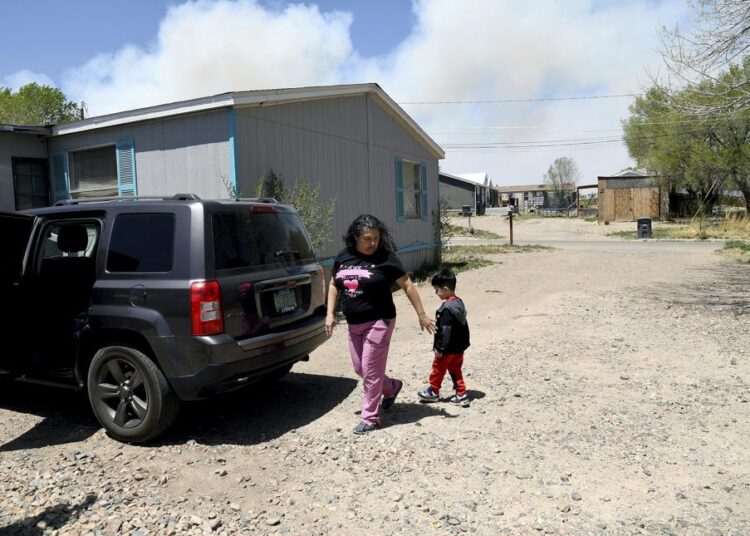LAS VEGAS, N.M. — Martina Gonzales and her grandson watched from their front yard as aircraft disappeared into a giant plume of smoke to fight a growing wildfire that has burned hundreds of square miles, destroyed about 170 homes and threatens more destruction if weekend winds whip, as predicted, through the foothills of the Rocky Mountains, according to AP.
“My grandson has actually, um, been a little bit scared, nervous,” Gonzales said Tuesday — the day New Mexico’s governor asked President Joe Biden to declare a disaster so federal aid can come for the largest blaze burning in the U.S.
“The smoke was really bad yesterday,” Gonzales said as 4-year-old Lukas, despite his fear, yelled “airplane” every time one flew to the fight to save Las Vegas, their small farm and ranch community in northeastern New Mexico.
Gonzales’ car is packed with valuables in case an evacuation order comes. But she said that if the entire regional hub of about 13,000 people has to flee, she’s not sure where they’ll go. The residential care home where she works as a pharmacist started moving elderly clients out on Monday.
Nearly 200 patients at the state psychiatric hospital in Las Vegas also evacuated Monday.
“We’ve been seeing a lot of fire trucks go up the street,” Gonzales said. “And actually, the fire looks like it’s right over this little mountain.”
During a briefing on the wind-whipped fire burning through dry landscape, Gov. Michelle Lujan Grisham signed her request for a presidential disaster declaration and said she hoped it would bring financial help for recovery efforts. She called it important to seek the declaration now, rather than waiting until the fire is out.
Lujan Grisham, a first-term Democrat who is running for reelection, said Tuesday night that the number of homes under mandatory evacuation had jumped from 6,000 to about 15,500. The governor said the number of homes destroyed would likely go much higher.
“I have families who don’t know what the next day looks like,” she said. “I have families who are trying to navigate their children and health care resources, figure out their livelihoods and they’re in every single little community and it must feel to them like they are out there on their own.”
Fire managers offered assurances, explanations and warnings at an evening briefing at the local community college. They put the amount of newly charred land up slightly on Tuesday, to about 231 square miles (598 square kilometers), but said containment remained at just 20%.
Dan Pearson, a U.S. Forest Service fire behavior analyst, called the day “a brief reprieve from the extreme conditions we have been experiencing,” but warned that dry winds are expected to increase and shift on Wednesday, pushing fire and smoke toward Las Vegas.
“Tomorrow, we’re back to red-flag criteria,” Pearson said, adding that forecasts called for better firefighting conditions Thursday and Friday before winds increase and gusts whip to 50 mph (80 kph) or more during the weekend.
“So, if I have one message out there: Please be super careful this weekend, more than you already are,” he said.
San Miguel County Sheriff Chris Lopez said he has fielded calls from people worried about safety if the fire crests a ridge just west of Las Vegas. Schools in the community canceled classes at least through Wednesday.
“I can tell you, from my training and experience, town is very defendable,” Lopez said. “As you go further into town, it becomes a lot more defensible. And you know, we’re doing everything we can to prepare for that.”
Fire engines and crews worked Tuesday on the edge of town, and bulldozers cleared more fire lines on the outskirts. Air tanker and helicopter pilots took advantage of a break in the thick smoke and falling ash to drop fire retardant and water.
Authorities said flames remain a couple of miles from Las Vegas, which is also home to the United World College and New Mexico Highlands University.
New Mexico has been swept by waves of hot, dry and windy weather across the Southwest. Forecasters have also issued warnings for parts of Arizona and Colorado, and authorities in Texas urged people there to be careful after several fires started on Monday.
Wildfires have become a year-round threat in the drought-stricken West — moving faster and burning hotter than ever due to climate change, scientists and fire experts say. Fire officials also point to overgrown and unhealthy forested areas where built-up vegetation can worsen wildfire conditions.
Nationally, the National Interagency Fire Center reported Tuesday that a dozen uncontained large fires have burned about 400 square miles (1,000 square kilometers) in five states, including New Mexico. Nearly 3,500 wildland firefighters and support personnel are assigned to fires burning across the country.
On the northern flank of the big New Mexico fire, crews were trying to keep the flames from reaching the towns of Cleveland and Mora as winds shifted, said Todd Abel, a fire operations section chief. Fire lines were holding, but state officials urged residents who have refused to leave evacuation areas to reconsider, calling conditions dangerous.
The fire merged last week with another blaze sparked in early April when a prescribed fire set by land managers escaped containment. The cause of the other fire remains under investigation.
Lujan Grisham said Tuesday that the federal government bears some responsibility.
Another New Mexico wildfire burning through forested areas to the northeast had forced the evacuations of about 800 homes while charring 92 square miles (238 square kilometers).
A separate fire burning in the mountains near Los Alamos National Laboratory prompted the evacuation of about 200 homes. It has charred more than 39 square miles (101 square kilometers) and destroyed at least three homes.






Discussion about this post